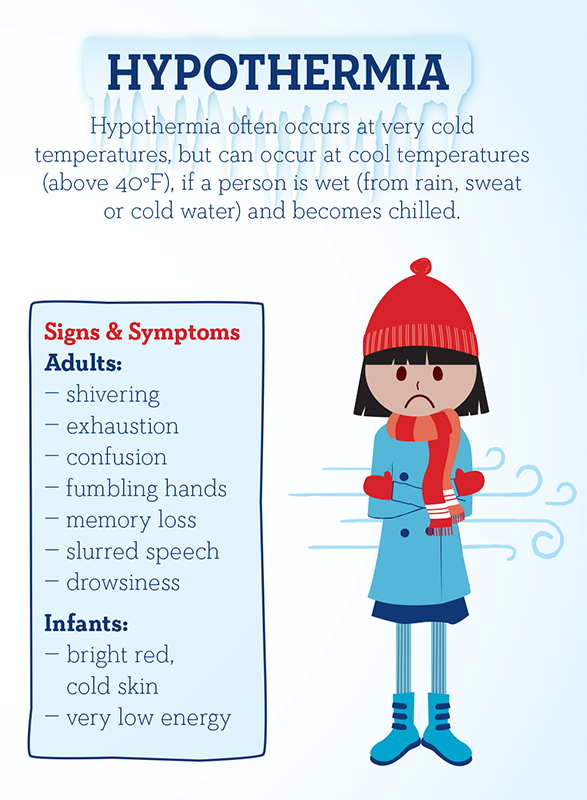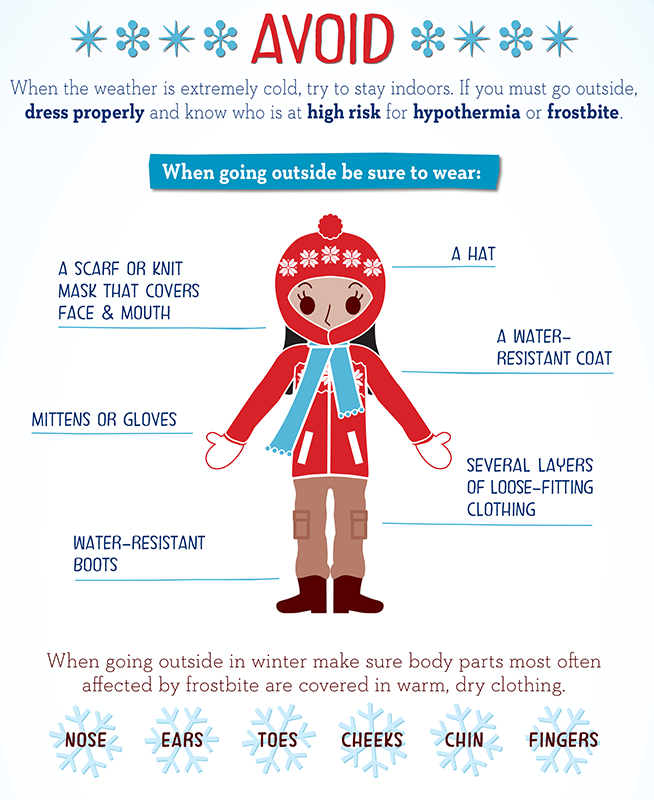Hypothermia
Stay Safe During Winter Weather - hypothermia

What is hypothermia?
Hypothermia is caused by prolonged exposures to very cold temperatures. When exposed to cold temperatures, your body begins to lose heat faster than it’s produced. Lengthy exposures will eventually use up your body’s stored energy, which leads to lower body temperature.
Body temperature that is too low affects the brain, making the victim unable to think clearly or move well. This makes hypothermia especially dangerous, because a person may not know that it’s happening and won’t be able to do anything about it.
While hypothermia is most likely at very cold temperatures, it can occur even at cool temperatures (above 40°F) if a person becomes chilled from rain, sweat, or submersion in cold water.
Who’s most at risk?
Victims of hypothermia are often:
Older adults with inadequate food, clothing, or heating
Babies sleeping in cold bedrooms
People who remain outdoors for long periods—the homeless, hikers, hunters, etc.
People who drink alcohol or use illicit drugs.

What are the signs and symptoms of hypothermia?
The following are warnings signs of hypothermia:
Adults:
Shivering Exhaustion or feeling very tired
Confusion
Fumbling hands
Memory loss
Slurred speech
Drowsiness
Babies:
bright red, cold skin
very low energy

Don’t wait – take action
Hypothermia is a medical emergency. If you notice any of the above signs, take the person’s temperature. If it is below 95° F, get medical attention immediately!
If you are not able to get medical help right away, try to warm the person up.
Get the person into a warm room or shelter.
Remove any wet clothing the person is wearing.
Warm the center of the person’s body—chest, neck, head, and groin—using an electric blanket, if available. You can also use skin-to-skin contact under loose, dry layers of blankets, clothing, towels, or sheets.
Warm drinks can help increase body temperature, but do not give alcoholic drinks. Do not try to give beverages to an unconscious person.
After body temperature has increased, keep the person dry and wrap their body, including their head and neck, in a warm blanket.
Get the person proper medical attention as soon as possible.
A person with severe hypothermia may be unconscious and may not seem to have a pulse or to be breathing. In this case, handle the person gently, and get emergency assistance immediately.
From the CDC Web Site
For more information and assistance, the Delaware County Health Department Wellness Line is available 24 hours a day, 7 days a week. In addition to responding to phone calls, the Wellness Line also responds to email inquiries.
Phone: (484) 276-2100 (Available 24/7)
Email: DelcoWellness@co.delaware.pa.us
